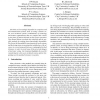3168 search results - page 7 / 634 » Computing Event Dependencies in System Designs and Programs |
JUCS
2007
13 years 7 months ago
2007
: This paper describes a method of using Petri net P-invariants in system diagnosis. To model this process a net oriented fault classification is presented. Hence, the considered d...
PRDC
2002
IEEE
14 years 16 days ago
2002
IEEE
Grid computing relies on fragile partnerships. Clients with hundreds or even thousands of pending service requests must seek out and form temporary alliances with remote servers e...
UM
2001
Springer
14 years 1 days ago
2001
Springer
This paper describes how a user modeling knowledge base for personalized TV servers can be generated starting from an analysis of lifestyles surveys. The aim of the research is the...
IEEEARES
2006
IEEE
14 years 1 months ago
2006
IEEE
Elections are increasingly dependent on computers and telecommunication systems. Such “E-voting” schemes create socio-technical systems (combinations of technology and human o...
ICFP
2008
ACM
14 years 7 months ago
2008
ACM
Transactional events (TE) are an approach to concurrent programming that enriches the first-class synchronous message-passing of Concurrent ML (CML) with a combinator that allows ...

